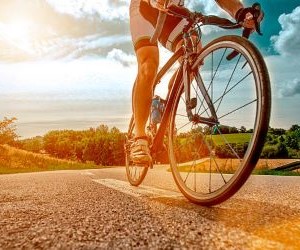Discover the powerful benefits of cycling every day—from better health and mental clarity to eco-savings and long-term fitness—one pedal stroke at a time.
HOW DO I RECOVER FROM SLEEP DEPRIVATION DURING ULTRA RIDES?
Sleep deprivation is one of the biggest challenges in ultra-distance cycling. Whether you're racing through the night or pushing for multi-day finishes, learning how to manage and recover from sleep loss can make or break your ride. This guide breaks down real strategies to help your body and brain bounce back, without losing momentum.

Why sleep loss hits ultra riders hard
In ultra-endurance cycling, especially events that span 24 hours or longer, sleep becomes a scarce resource. Riders often choose to minimize sleep to stay competitive—but the cost can be steep. Sleep deprivation affects reaction time, decision-making, mood, and even physical performance.
What happens when you lose sleep?
Going without adequate sleep for more than 24 hours places the body under significant stress. Cortisol levels rise, cognitive functions drop, and your body struggles to regulate temperature and energy efficiently. Micro-sleeps can occur without warning, and hallucinations are not uncommon during multi-day events.
Reaction time slows by up to 40% after 24–36 hours
Mood regulation and emotional control decrease
Hormonal imbalance affects recovery and metabolism
Sleep debt reduces coordination and bike handling ability
Increased risk of injury or crash due to fatigue
Unlike muscle fatigue, you can’t “push through” sleep deprivation for long without consequences. That’s why recovery planning is critical if you’re going to survive—and thrive—on ultra rides.
Strategies to recover on the bike
Recovery from sleep loss doesn’t always mean stopping completely. For ultra riders, it's about smart time management and incorporating micro-recovery periods that add up. These strategies can help mitigate sleep debt while keeping you rolling forward.
Use power naps strategically
A 10–20 minute power nap can reset your brain, reduce grogginess, and significantly improve cognitive function. Set an alarm, lie down somewhere safe (shelter, bivy, hotel lobby, etc.), and protect your belongings. Even short naps help reboot alertness during low-energy windows like 2–5 AM.
Avoid naps longer than 30 minutes unless fully stopping for sleep
Use caffeine immediately after waking for an added alertness bump
Track when your performance drops—plan naps just before
Adjust pacing and avoid night surges
Riding hard late at night burns precious mental fuel. Instead, slow your pace, focus on nutrition, and aim for steady cadence. Avoid technical descents or risky segments when sleep-deprived—this is when crashes are most likely to happen.
Maximize alertness with environment cues
Keep lights bright and flashing at night
Play music or podcasts through one earbud
Engage in mental games or simple counting exercises
Talk out loud or call someone during sleepy spells
Change positions on the bike frequently
None of these replace actual sleep—but they can buy you a few more hours until your next planned rest.
Post-ride recovery and long-term reset
Once the ride ends, your number one priority is restoring balance. Sleep deprivation recovery takes more than just a single good night’s sleep. You’ll need a multi-day approach to fully return to baseline—and avoid long-term burnout.
How to repay your sleep debt
Experts recommend adding 1–2 extra hours of sleep per night for several days after a major ultra event. Daytime naps of 30–90 minutes can also help. The key is consistency and avoiding stimulant overuse that disrupts your circadian rhythm.
Sleep in a dark, quiet room—use masks and earplugs if needed
Limit screen time at night to improve melatonin production
Avoid alcohol and heavy meals before bed
Use magnesium or valerian supplements if approved by your doctor
Hydrate and eat carbs post-ride to aid deep sleep
Monitor for overtraining or cognitive fatigue
Extreme sleep loss combined with physical strain can lead to overtraining syndrome. Watch for signs like low motivation, brain fog, mood swings, or poor HRV (heart rate variability). Don’t rush back into intense training until you feel mentally sharp and emotionally stable again.
Grind culture may glorify sleep deprivation—but real performance comes from knowing when to push and when to rest. Recovery is a skill, and mastering it separates finishers from DNF stories.
Whether you’re chasing a podium or simply testing your limits, managing and recovering from sleep loss is essential for ultra cycling longevity. Listen to your body, plan your rest like you plan your nutrition, and respect sleep as your ultimate recovery tool.
YOU MAY ALSO BE INTERESTED








